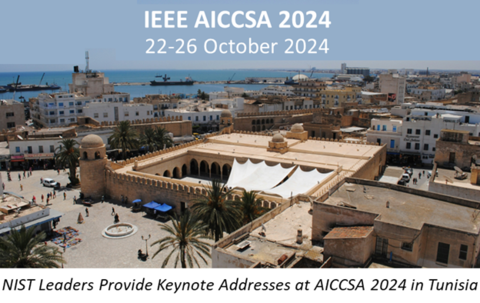NIST Leaders Address the 21st International ACS/IEEE International Conference on Computer Systems and Applications in Tunisia

NIST researcher leaders Edward Griffor, Tao Zhang, and Abdella Battou addressed the 21st International ACS/IEEE International Conference on Computer Systems and Applications (AICCSA 2024) in Sousse, Tunisia, held on 22-26 October 2024. The conference sessions included presentations on Ubiquitous, Parallel and Distributed Computing (including cloud, IoT, network, sensors, and blockchain technologies); Security, Privacy, and Trust; Data Science, Knowledge Engineering, and Ontologies (including Information Retrieval, Big Data, Databases, and Knowledge Systems); Artificial Intelligence & Cognitive Systems; Natural Language Processing; and Multimedia, Computer Vision, and Image Processing.
Dr. Griffor’s keynote on using Artificial Intelligence/Machine Learning (AI/ML) to assess autonomous system performance described current progress on developing performance metrics for these systems. Griffor plotted the evolution of system energy/processing usage as an AI-equipped system reasons, and learns, about its operating environment, and he explained how the system reduces the “informational dimension” of its operating environment, improving its overall performance. Griffor pointed to how the system’s rules emerge and make action progressively more energy/processing efficient. As action patterns emerge, these rules can be “exported” as structure in the environment, resulting in autonomous systems that can manage tradeoffs between the limited resources of time and energy to meet quality objectives.
Dr. Zhang’s keynote on edge AI and 6G discussed the essential roles of edge AI in 6G and beyond networks. Zhang described how edge computing has evolved to edge AI, and how edge AI is further evolving toward an AI continuum that seamlessly spans from the user to the cloud. He discussed how edge AI and the AI continuum are becoming increasingly important for future AI and 6G networks. He further discussed possible initial steps toward an AI-native 6G network architecture that will be enabled by edge AI and the AI continuum.
Dr. Battou’s keynote on quantum networking described current work on the Multiverse platform for quantum networks and experiments management. He explained the choice of microservices for the architecture and the Vert.x framework for its implementation. He then detailed services such as Topology, Configuration, Fault, and Security and how they are currently used in the NIST testbed and the Washington Metropolitan Quantum Network Research Consortium (DC-QNet).

